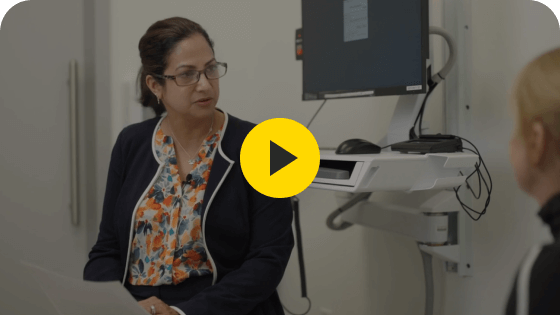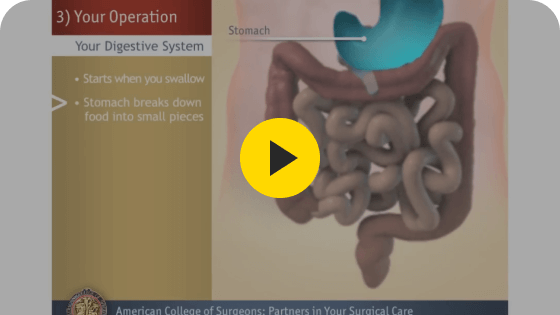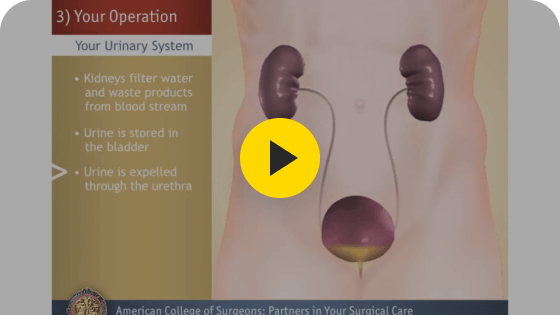

Preparing for ostomy surgery
If you are facing ostomy surgery, you are likely dealing with a lot of emotions – ranging from fear of the unknown to hope that your quality of life will soon be improved. The more prepared you are before surgery, the more confident you will feel as you embark on your recovery.
“I can fly on planes and go to the movies or theater without having to worry about where I am going to sit and whether I‘ll be able to make it to the bathroom in time. And best of all, I am NOT IN PAIN, which has lifted a huge physical and psychological burden and added an enormous level of enjoyment to my life.”
Partnering with your medical team

10 questions for your surgeon from the American College of Surgeons

Understand pain management options post-surgery to discuss with your surgeon provided by the American College of Surgeons
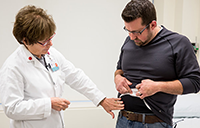
Watch a pre-op appointment with WOC nurse Angie Gilbert, to help answer your questions and explain the importance of stoma site marking.
Learn about your procedure
What is a colostomy / ileostomy?
What is a urostomy?
“My dear ostomy nurse gave me more than just tips on how to take care of my stoma. She has played a huge role in my deciding what direction to go with life. I hope to one day help someone the way she helped me.”

Add a WOC Nurse to your team
If you or a loved one is facing ostomy surgery, having a Wound, Ostomy and Continence (WOC) nurse on your team is a tremendous asset. Evidence shows that patients in facilities with WOC nurses had significantly better outcomes, compared to those without WOC nurses. Ask your surgeon if you will have access to a WOCN.
You can find one in your area or connect virtually with a WOCN through the UOAA Ostomy Clinic.

Watch a pre-op appointment with WOC nurse Angie Gilbert, to help answer your questions and explain the importance of stoma site marking
Find a colorectal surgeon
Find NowBefore surgery
What should I do before I go to the hospital?
- Arrange childcare and pet care as necessary.
- Pay bills or set up auto-pay.
- Remove any clutter or cords as well as area or throw rugs that could impede your mobilization around your home.
- Arrange household items you may need so that they are easily accessible and positioned to minimize stairs, bending down or reaching high.
- Wash your hands often and avoid people who are ill.
- Prepare meals for yourself, buy frozen or easy to prepare meals, or arrange for meals to be delivered.
- Be prepared for a skin check. Keep your skin healthy. If you have open wounds, bites, sores, scratches, or rashes anywhere on your body, your surgery may be cancelled.
- Schedule your first postoperative visit based on your doctor’s recommendation.
What should I pack?
- Pack minimally
- Paperwork
- Picture ID
- Copayment or other payment
- List of medications you are currently taking
- Cell phone
- Ear plugs and eye mask to help you sleep
- Phone charger with long cord
- Your own pillow
- Glasses or contact lenses
- One or two small pictures of loved ones
- Journal to record your recovery or take notes
Do not bring:
- Valuables such as money, jewelry, wallet, or computers.
- Your medications – as they will be provided for you in the hospital.
One week before surgery
- NO ALCOHOL. If you drink alcohol, stop.
- STOP taking anti-inflammatory drugs, herbal supplements, vitamins, and blood thinner medications as directed by your doctor.
- STOP shaving, waxing, or any other hair removal at the surgical site.
- STOP taking any medications as advised by your care team. (Motrin, ibuprofen, or other aspirin products).
- If you have changes to your health or if your surgery needs to be postponed, call your doctor
- Prepare your home for post-surgery. This includes placing common items (clothes, food, toiletries) in easy-to-reach areas.
Day before surgery
- Begin fasting eight hours before surgery. This will help decrease anesthesia side effects including nausea, vomiting, or an upset stomach. You may take a small sip of water to take any allowed medications the morning of surgery.
- Stop chewing gum. This includes both the day before surgery and the day of surgery. Chewing gum increases the production of saliva and this leads to an increase in the amount of fluid in the stomach.
- Remove nail polish from your toes and fingers. Cut your nails short. Shower and wash your hair.
- Go to bed early and get a good night of rest.
- Use positive self-talk and tell yourself “I’ve got this. I may need a little help, but I can do this!”
Wondering what your life after
ostomy surgery will be like?
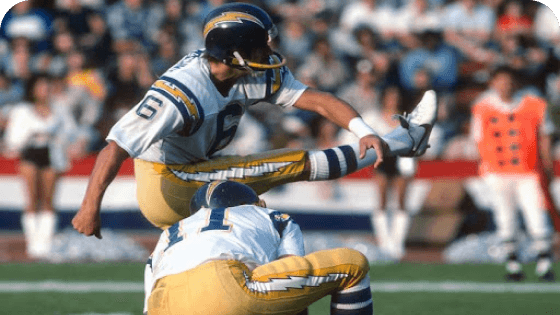
Rolf Benirschke
Hear a “patient to patient” conversation between Rolf, ostomate and retired NFL kicker and someone who is considering ostomy surgery.

Rob Hill
First ostomate to climb the Seven Summits, the tallest peak on every continent in his “No Guts Know Glory” campaign.

Jonathan Negretti
Seven marathons in seven days on seven continents!

Beth Hudson
A tragic motorcycle accident left Beth with an ostomy and an amputated left leg. She now loves biking with her husband, sit skiing, swimming and she even attended Mermaid Camp!

Cassidy Bargell
As a full contact rugby player at Harvard, Cassidy Bargell was fit and strong and at the top of her game until her severe abdominal cramps put her on the sidelines.

Conner Reese
Conner had a lifelong dream of following in his father’s footsteps and enlisted in the United States Marines right after high school. He showed great promise and was excited about his future until his severe UC derailed that dream with ostomy surgery. He’s now pursuing a career in medicine to help patients learn to embrace their ostomy life.

Peter Yarrow
Being a member of the international folk group of the 60/s, Peter, Paul & Mary, gave Peter the opportunity to share his music with audiences around the world. Following his bladder cancer diagnosis, Peter had a urostomy and soon returned to traveling, performing and spreading his message of healing and hope.

Nancy Mike
Nancy Mike coached her high school volleyball team to the state championships twice! At 67 she was still at the top of her game, training for a half marathon and playing in a senior volleyball tournament when she was diagnosed with bladder cancer.

